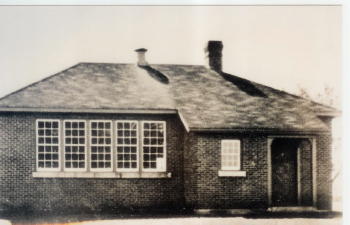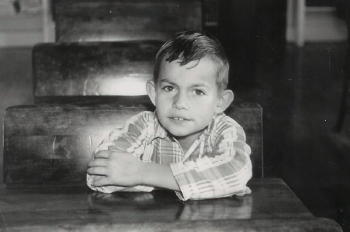Prince Edward County, Ontario, Canada
School Days
MEMORIES OF SS#14
 The year was 1956, and the entire school – all 13 of us – wondered what our new teacher would be like. Little did I know when she walked into the classroom of that one room school, not far from where I live today, that she would be largely responsible for my current passion for birds, and nature in general. Her name was Marie Foster – of course, to us, she was simply, Miss Foster – and she constantly amazed us with her stories of backyard birds, and how they came to her hand for offerings of sunflower seeds. I lived on a farm, and her inspiration made me more aware of the birds that I saw regularly from the tractor seat. In those days, the majority of kids who attended our school lived on farms, and operated tractors when only 12 years of age. However, I seemed to be the only one in our rural school who was touched deeply enough by Miss Foster’s stories to make the study of birds a career choice.
The year was 1956, and the entire school – all 13 of us – wondered what our new teacher would be like. Little did I know when she walked into the classroom of that one room school, not far from where I live today, that she would be largely responsible for my current passion for birds, and nature in general. Her name was Marie Foster – of course, to us, she was simply, Miss Foster – and she constantly amazed us with her stories of backyard birds, and how they came to her hand for offerings of sunflower seeds. I lived on a farm, and her inspiration made me more aware of the birds that I saw regularly from the tractor seat. In those days, the majority of kids who attended our school lived on farms, and operated tractors when only 12 years of age. However, I seemed to be the only one in our rural school who was touched deeply enough by Miss Foster’s stories to make the study of birds a career choice.
It was 1951 when I started attending the one-room school on Big Island, just 12 miles or so north of Picton, on the shore of the Bay of Quinte. There is an element of truth in the old timers’ claims of walking two miles to school, uphill both ways, through snow up to the waist. Until I received my first bicycle at the age of 11, I did walk to school, but it was more like a mile and a half, and ironically, the route did have a small hill at each end which led some credence to the popular claims. Given that our waists were rather low to the ground in our youth, I suppose we did have snow that seemed that deep. Certainly the snowplow came around only when it was virtually impossible for the essential vehicles of the day to make their routes – the milk truck, the cream truck and the bread truck. The motoring public did not think of themselves as “essential” as they do today, and simply reworked their schedules to accommodate the appearance of the plows. We knew they would be around eventually.
Looking back, some of the things we routinely did at our one-room school would be frowned on today. There were two outhouses in the schoolyard, each one partially hidden by groves of lilacs. The girls’ toilet was always neat, stood straight and erect, and even smelled better too. We knew this because we routinely played in the bushes where over many years, students before us had created tunnels and passageways through the lilacs where secret meetings and important decisions of the day would be made. Many of us even ate our lunches in there, our backs propped up against the outside wall of the structures! The boy’s toilet always listed to port, and rarely had a door. It suffered terribly on its hinges through the years after being carelessly flung open, or left ajar to the mercies of the west winds. So, it was often necessary for us to sit on the toilet seat without benefit of a door, and watch the neighbour cultivate his fields with his old Farmall tractor only a short distance away. You might say we communed with nature, while answering its call.
The boys were considered by the girls to be unquestionably uncouth and we certainly did many things to justify the dubious award. Boys sitting on the seat for example would always watch, mesmerized, as the urine seeped through the poor construction and travelled in a concentrated flow along the floorboard toward the door. Only the older boys could produce enough volume to force the stream of pee the full length of the floor and over the threshold! It was a victory that would always be celebrated alone, and seldom shared among our friends. Such feats among the boys were always held in high regard.
 But as gross as we were considered among the fairer sex, there was solidarity among us when we played baseball at recess. Except for tag and blind man’s bluff, there really wasn’t a whole lot else to keep us occupied during the spring and fall months. A set of swings and a teeter totter made up the balance of the schoolyard amenities. There were rules – we weren’t permitted beyond the school grounds, and that included the church property beside us, and anything across the road. The exception was the neighbour’s field, when the small confines of the school yard resulted in many baseballs crossing the fence during home runs.
But as gross as we were considered among the fairer sex, there was solidarity among us when we played baseball at recess. Except for tag and blind man’s bluff, there really wasn’t a whole lot else to keep us occupied during the spring and fall months. A set of swings and a teeter totter made up the balance of the schoolyard amenities. There were rules – we weren’t permitted beyond the school grounds, and that included the church property beside us, and anything across the road. The exception was the neighbour’s field, when the small confines of the school yard resulted in many baseballs crossing the fence during home runs.
Like most schools of that era, the building not only lacked washroom facilities, but running water of any kind. Water was routinely carried daily in a pail from the hand pump located in the corner of the yard, only a scant few feet from the edge of the road. Weekly, one person would be in charge of hauling the pail of water to the school for without there would be no water to drink, or available to wash our hands before lunch.
We never complained. All these little tasks assigned to us each week – water boy, bell ringer, even the thermometer reader (never could figure why we had to record the indoor temperature every day) – they all gave some of us our first taste of responsibility, if only in a small way. The majority of us were good students. Being in a small classroom, with all grades present, those in lower grades often eavesdropped on the sessions being conducted between the teacher and higher grades, giving us a running start in the following year’s education.
Somehow the teacher maintained control while teaching eight grades of students. It was an era of the five and dime. Five if you misbehaved at school, and ten when you got home. Somehow the parents always seemed to know. Our last teacher seldom used the strap as she had a sure fire way of maintaining law and order. Many a time I ducked as the strap went sailing over my head, landing with uncanny precision beside the student at whom it was aimed. When told to bring the forbidding instrument to the front desk, that was usually sufficient punishment for the offending student. Nothing more needed to be done, or said.
In the end, all was always forgiven, and the end of the school year was celebrated with a school party, often at the teacher’s house. It was a time when we were all equal, boys were no longer gross, and girls were no longer dorky, and teacher and students said their goodbyes for another year.
They were good times, and often I think when I see cashiers behind a counter using a calculator to add up simple figures, or an attendant at a fast food take-out being unable to make change without benefit of the cash register, that we have lost something along the way.